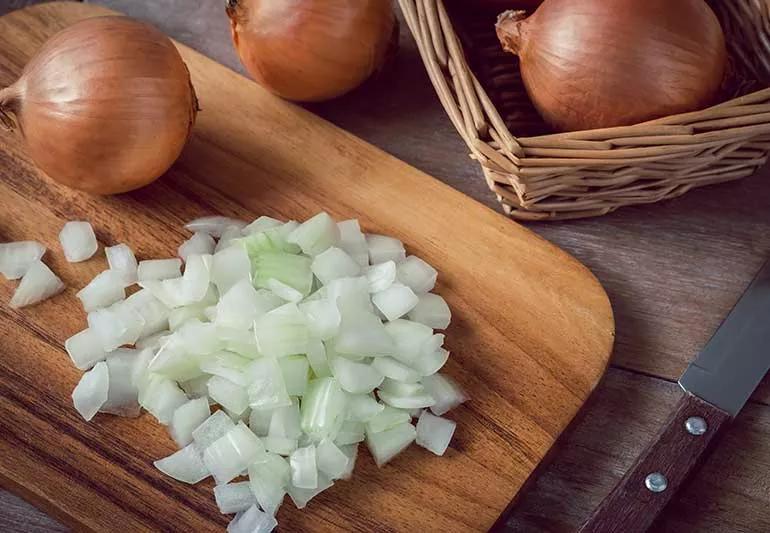Beyond the tell-tale aroma, onions also provide benefits like strong bones and a healthy heart

They may bring tears to your eyes and a stench to your breath. But onions also add a lot of flavor to dishes. Whether you like this root vegetable raw or cooked, there are many health benefits to eating onions.
Advertisement
Cleveland Clinic is a non-profit academic medical center. Advertising on our site helps support our mission. We do not endorse non-Cleveland Clinic products or services. Policy
Onions are part of the Allium family, a group of spicy, sharp root vegetables that includes garlic, leeks and chives. They’re especially high in organosulfur compounds. These chemicals give onions their strong odor and taste (and make you cry). They also have many health benefits. “People have used onions for medicinal purposes for centuries,” says registered dietitian Gillian Culbertson, RD, LD.
With hundreds of varieties — from tangy white onions to sweet Vidalias — it’s easy to add onions to your meals. Getting more of this veggie into your weekly diet may help to:
Initial laboratory studies suggest that organosulfur compounds may stop cancer cells from multiplying and growing, causing the cells to die. (Please note that this study hasn’t yet been reproduced in humans, so while the results are promising, we can’t know for sure if the effect will be the same in humans.)
A 2019 study found that consuming 35 pounds of onions and other allium vegetables every year may lower your risk of colorectal (colon) cancer by almost 80%. Most Americans consume about 22 pounds of onions in a year, according to the National Onion Association.
Additional studies suggest that an onion-rich diet may lower your risk of:
Advertisement
Onions have more than 25 different flavonoids — natural plant substances that have antioxidant properties. They’re also high in vitamin C, another important antioxidant that supports a healthy immune system. “Antioxidants protect against free radicals that cause inflammation and contribute to chronic diseases like cancer, diabetes and heart disease,” explains Culbertson.
For maximum antioxidant benefits, choose colorful red onions, which have flavonoids called anthocyanins that give the vegetable their color. Because research shows an onion’s outer layers have the highest concentration of flavonoids, try to keep as much of that part as possible when removing the skin.
Another flavonoid found in onions — quercetin — offers many heart-healthy benefits, especially for people experiencing obesity and metabolic syndrome. “Metabolic syndrome is a combination of risk factors, including excess weight, high blood pressure, high cholesterol and high blood sugar, that increases your risk for heart disease,” says Culbertson.
Onions also appear to have blood-thinning abilities, which can help prevent blood clots that cause heart attacks and strokes.
Because quercetin builds up in your bloodstream over time, consistently consuming onions can lead to greater antioxidant benefits. Different studies indicate that eating more onions may improve heart health by helping to:
The antioxidants in onions may also reduce bone loss and osteoporosis that often occurs with aging. “Antioxidants minimize the stress that damages healthy cells and speeds up the aging process,” notes Culbertson.
Sipping on onion juice may sound unappetizing. But a 2016 study found that healthy people in middle age and postmenopause who drank 3 ounces of onion juice every day for eight weeks had less bone loss and stronger bones. Another study suggests that women over 50 who eat an onion a day may:
There’s some evidence that quercetin has antibacterial properties, and storing onions for at least three months increases quercetin levels. A 2018 systematic study found that consuming onions may slow or stop the growth of bacteria that cause:
Advertisement
Onions are a rich source of prebiotics and fiber. “Gut bacteria break down insoluble or undigested fiber, causing fermentation,” says Culbertson. “In this way, onions serve as a prebiotic or food source for the bacteria, which aids digestion.”
Unfortunately, this fermentation can also cause gas and bloating. “Cooked onions are easier to digest and less likely to cause digestion problems than raw onions,” shares Culbertson.
A medium 5.3-ounce onion has approximately:
Nutrient-wise, a medium onion has:
You can buy onion supplements, including onion juice, online and at local stores. But Culbertson cautions that you’ll get more health benefits from onions if you eat the actual vegetable. “It’s always best to get nutrients from foods when possible.”
While your body might appreciate the numerous health benefits of eating onions, those close to you might turn up their noses. The sulfur compounds can make your breath and sweat a little rank. Eating cooked onions instead of raw ones can help. Sauteing, caramelizing, frying or cooking onions lowers the sulfur content. You can also try mints or gum to freshen your breath after a meal.
Advertisement
Learn more about our editorial process.
Advertisement

The tropical fruit is a good source of antioxidants and vitamin C

High amounts of cholesterol and saturated fat in red meat may be linked to heart disease

The leaves and pods from this tree are rich in essential nutrients

This starchy root vegetable is a staple in many global cuisines — but it has to be prepared correctly, or it can cause serious concerns

These delicate green sprouts can give you an extra dose of vitamin K and other nutrients — but they’re not safe for everyone

Edamame, lentils and chicken breast are good sources of protein

Eating this root vegetable can help support your eye, heart and brain health

The flavorful herb is full of antioxidants that may help regulate blood sugar

Wearing a scarf, adjusting your outdoor activities and following your asthma treatment plan can help limit breathing problems

Your diet in the weeks, days and hours ahead of your race can power you to the finish line

When someone guilt trips you, they’re using emotionally manipulative behavior to try to get you to act a certain way